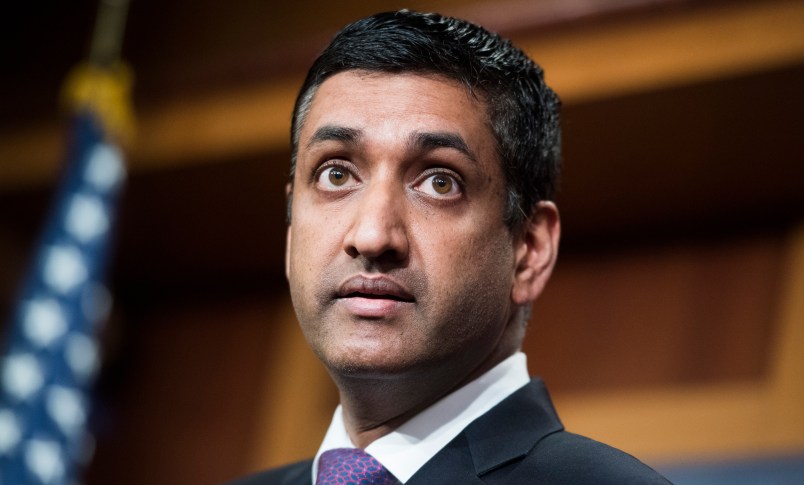After a week of furious battles over House Democrats’ campaign arm move to blackball any operatives who back primary opponents to members, one progressive thinks he might have a compromise solution.
Rep. Ro Khanna (D-CA), one of the House Democrats who’s been the most vocally critical of the Democratic Congressional Campaign Committee’s new policy, said he thought there might be a solution where the committee changed its policy so that it only applied to strategists who went after sitting members in swing districts.
“I think there could be special circumstances perhaps for frontline members. That would be one possibility. There could be other compromises that could work,” Khanna told TPM during a sit-down with a handful of reporters Monday morning, referring to the group of Democrats the organization views as vulnerable in the 2020 general election.
“That wouldn’t be how I do things, but I’m saying at least they should offer certain compromises and we could look to other members and see if that’s something other people could live with,” Khanna continued. “Most of the progressives that I know are willing to engage in a conversation to see if there could be some kind of constructive way forward, because we’re team players for the caucus. What we won’t accept is total intransigence.”
That’s a potential way out for the DCCC, which set off a firestorm within the Democratic caucus last week with a new requirement that any vendors who work with the group pledge to not back primary challengers to any incumbents. That pledge has enraged members, most of them on the left, who think the move is stifling competition and could hurt the party.
“The core mission of the DCCC is electing House Democrats, which includes supporting and protecting incumbents,” the form read. “To that end, the DCCC will not conduct business with, nor recommend to any of its targeted campaigns, any consultant that works with an opponent of a sitting Member of the House Democratic Caucus.”
That move puts immense pressure on Democratic campaign firms not to help out politicians running against Democratic incumbents. The organization has a ton of pull in determining which vendors and firms get hired by their candidates and campaigns, as well as for its well-funded independent expenditure efforts. The DCCC has quietly steered work away from firms it viewed as trouble-makers in past cycles, but has never had an explicit loyalty pledge policy. And last cycle, firms helping serious primary challenges to members including Rep. Dan Lipinski (D-IL) didn’t face any recriminations.
The new policy has frustrated members like Khanna who came to Congress by beating a sitting Democratic member of Congress in a primary.
Khanna and House Progressive Caucus co-chairs Pramila Jayapal (D-WA) and Mark Pocan (D-WI) met with Democratic Congressional Campaign Committee Chair Cheri Bustos (D-IL) last week to make their displeasure clear and ask for her to back off the change, but say she refused to budge.
Things escalated significantly over the weekend, when star freshman Rep. Alexandria Ocasio Cortez (D-NY) called for donors to stop giving to the DCCC and instead give directly to frontline Democratic members until and unless the organization reversed course.
That’s a major threat in its own right: The DCCC relies heavily on its online small-dollar donation program.
Khanna said he’s not ready to go as far as Ocasio Cortez, and wouldn’t commit to withholding support to the DCCC if organization didn’t change its policy.
“I’m not in a place right now where I’d say I’m going to withhold support … holding the majority is very, very important, even if i find this policy terrible,” he said.
Khanna made it clear that he hasn’t discussed the idea with Bustos, so it’s unclear whether this suggestion has legs. The DCCC didn’t immediately respond to a request for comment on the proposal.










